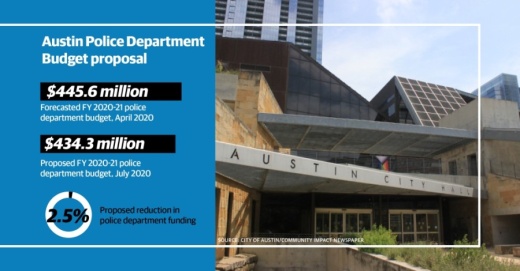The $4.2 billion overall budget and the $1.1 billion taxpayer-supported general fund for fiscal year 2020-21 are both largely unchanged from last year. Property tax revenue would increase by 3.5%, resulting in a $19.73 increase in annual city property tax payments for the homeowner of a median-valued $362,000 property.
Community groups, such as the Austin Justice Coalition and Grassroots Leadership, have called on the city to reduce the police department budget significantly and reassign certain duties, such as responding to mental health crises, to other departments or public agencies.
On June 11, City Council voted on a set of four policies aimed at responding to the growing local and national momentum around policing, including a commitment to spending fewer public dollars on the police budget.
The $11.3 million cut would put the overall police department funding in FY 2020-21 around $434.3 million overall—a 2.5% reduction from the forecasted budget this spring.
Alicia Torres of community advocacy group ICE Fuera de Austin, or ICE Out of Austin, said that reduction is not enough and that city leaders should listen to community members who want to see more money diverted from the police budget to the city's Relief In a State of Emergency Fund, or RISE Fund.
"We are not asking City Council to take a wild guess as to where the money needs to go. We are providing them a roadmap as to where the money needs to go," Torres said.
David Johnson, criminal justice organizer at Grassroots Leadership, said the proposal to cut just $11 million from the budget is "disrespectful" to those calling for more broad, sweeping changes.
"$11 million is spitting in our eyes. $11 million is telling the city, 'We don't take your needs or your wants seriously, and this is the best we're going to give you,'" Johnson said.
Ed Van Eenoo, the city's deputy chief financial officer, said most of the projected savings would come from eliminating 100 vacant police officer positions from the forecast budget. Other cost-cutting measures include delaying the July 2020 cadet class and holding off on replacing officers' service pistols.
Ken Casaday, president of the Austin Police Association—the union representing police—said the city had an agreement with the police department to add 30 positions a year and that the city staff are now "going back on their word" by eliminating the vacant positions in the budget.
The positions are needed for Austin police to provide a high level of service to the community, Casaday said. In an average year, about 50 Austin PD officers retire, according to Casaday, but in 2020, he said, 60 officers have retired already.
"Cutting officers like they did was, in my opinion, irresponsible," he said.
In June, amidst nationwide protests to reform policing following the killing of George Floyd in Minneapolis, the Austin Justice Coalition called for a $100 million reduction to the police department budget.
In a statement released after the proposal, AJC Executive Director Chas More said the proposed budget "comes nowhere near" the changes the group thinks are appropriate.
Most City Council members who sat down for interviews with Community Impact Newspaper said they wanted to see significant change in the city's approach to policing but were not sure how those changes would translate to a dollar amount in the budget. However, Mayor Pro Tem Delia Garza and District 4 City Council Member Greg Casar both said they would like to see a $100 million reduction.
“I mean, $100 million is less than 25% of the police budget. I would say asking for a 25% reduction is the right thing to be doing right now. Frankly, you always ask for more than what you think you can get," Garza said.
Casar released a statement after the proposal saying the budget is an incremental step in reducing patrol funding in favor of community safety, but he said "it is far from enough."
COVID-19 impact
Despite declining sales tax revenue—which makes up roughly a quarter of the city's general fund—Van Eenoo said a hiring freeze, limiting additions of positions, the increase in property tax funding and the city's "austere" approach will allow Austin to keep the budget flat.
The most recent data from the Texas State Comptroller's Office shows that in May, Austin took in $17.5 million in sales tax revenue, down 10.8% from the same period the year before.
Van Eenoo said city staff projects those revenue numbers will rebound slightly in the future, although they likely will not return to 2019 levels, allowing the city to avoid layoffs and give employees a 2% salary increase.
Under Gov. Greg Abbott's disaster declaration due to the outbreak of COVID-19, Van Eenoo said the city had the option of increasing property tax revenue by up to 8% without needing to go to the voters for a tax rate election. However, in recognizing city leaders may ask voters in November to approve a tax increase for Capital Metro's $9.8 billion plan to revamp public transportation in the area, Van Eenoo said city staff wanted to keep the budget conservative.
"We felt it was important to bring the budget forward with as low a tax rate as possible," he said.
The city is scheduled to hold public input sessions on the budget July 23 and 30, and City Council will hold work sessions July 28 and Aug. 4. Council will then hold meetings beginning Aug. 12 to adopt the budget.
Editor's note: This story has been updated with additional information after it was originally posted, including a clarification to the police budget reduction figures.





